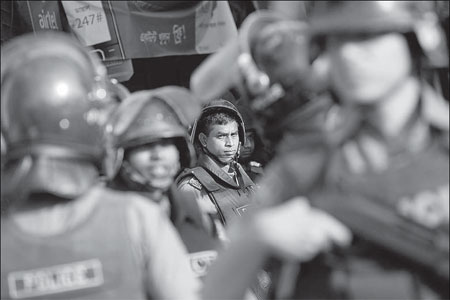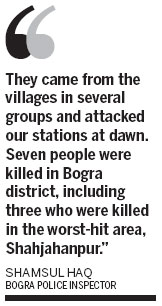|
Police raid an area after activists from Bangladesh's Jamaat-e-Islamiset a fire on a street during the first day of a three-day-long strike toprotest the decision by the country's war crimes tribunal to deliverjudgment in the cases involving their top leaders in Dhaka on Sunday.Andrew Biraj / Reuters
|
Bangladesh deployed troops in the north of the country on Sundayafter 16 more people were killed in a fresh wave of violence over theconviction of Islamist leaders for war crimes in the Muslim-majoritynation.
Thirteen were shot dead in the north and northeast and onepoliceman was killed in clashes with protesters in the western districtof Jhenidah, police officials said, adding two people were killed lateon Saturday.
In the northern district of Bogra, at least 10,000 protesters armed withsticks, home-made bombs and other weapons attacked five policestations, forcing police to open fire on them, police inspector ShamsulHaq said.
"They came from the villages in several groups and attacked ourstations at dawn. Seven people were killed in Bogra district, includingthree who were killed in the worst-hit area, Shahjahanpur," he said.
Troops have been deployed in Shahjahanpur to strengthen security,he said.
Four people were shot dead in the northwestern town of Godagari after police and borderguards opened fire on thousands of protesters from the Jamaat-e-Islami party after theyattacked police with sticks and stones, the area police chief said.
The death toll in the clashes over the war crimes verdicts has risen to 72 since the first wasannounced on Jan 21, police said, including 56 killed in the four days since Jamaat's vice-president was sentenced to death.
Delwar Hossain Sayedee was on Thursday found guilty of murder, religious persecution andrape during the 1971 independence war against Pakistan. The sentence triggered violentclashes across the country between rampaging Jamaat supporters and police.
The 73-year-old firebrand preacher was the third person to be convicted by the war crimestribunal. The verdicts have sparked outrage among Islamists.
Jamaat, the nation's largest Islamic party, says the process is more about settling scores thandelivering justice.
The party has called a nationwide strike to protest at the verdicts and the killing of its activistsby police.
Security was tight in the capital, Dhaka, with around 10,000 policemen on patrol, and shopsand schools were closed. Inter-city motorways and roads in the Dhaka and the port city ofChittagong were empty.
Rival's stronghold
Bogra is a political stronghold of Begum Khaleda Zia, head of the main opposition BangladeshNationalist Party and archrival of Prime Minister Sheikh Hasina.
The two women have shaped the country's politics since 1991, both serving terms as primeminister followed by spells in opposition. They routinely accuse each other of politicalvengeance and provoking violence.
Sunday was the first day of a three-day strike called by the Jamaat-e-Islami and the BNP.
Hasina set up the tribunal in 2010 to investigate abuses during the war that claimed about 3million lives. Thousands of women were raped.
The two opposition parties say the prime minister is using the tribunal to persecute them. Thegovernment denies that and says justice must be served.
Bangladesh became part of Pakistan at the end of British colonial rule in 1947. But the country,then known as East Pakistan, won independence with India's help in December 1971 followinga nine-month war against the then West Pakistan.
Some factions in Bangladesh opposed the break with Pakistan, including the Jamaat-e-Islami.Its leaders have denied involvement in abuses.
On Saturday minority groups appealed to the government for increased security after a seriesof attacks on Hindu temples and houses by Jamaat supporters, in which one Hindu man waskilled. Jamaat denied they were behind the attacks.





0 comments:
Post a Comment